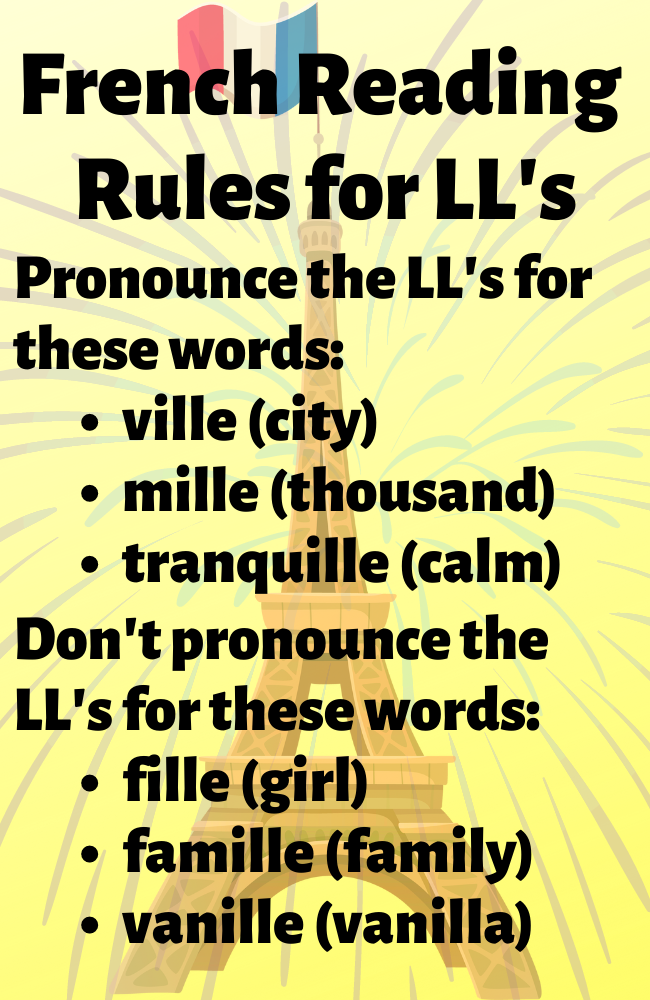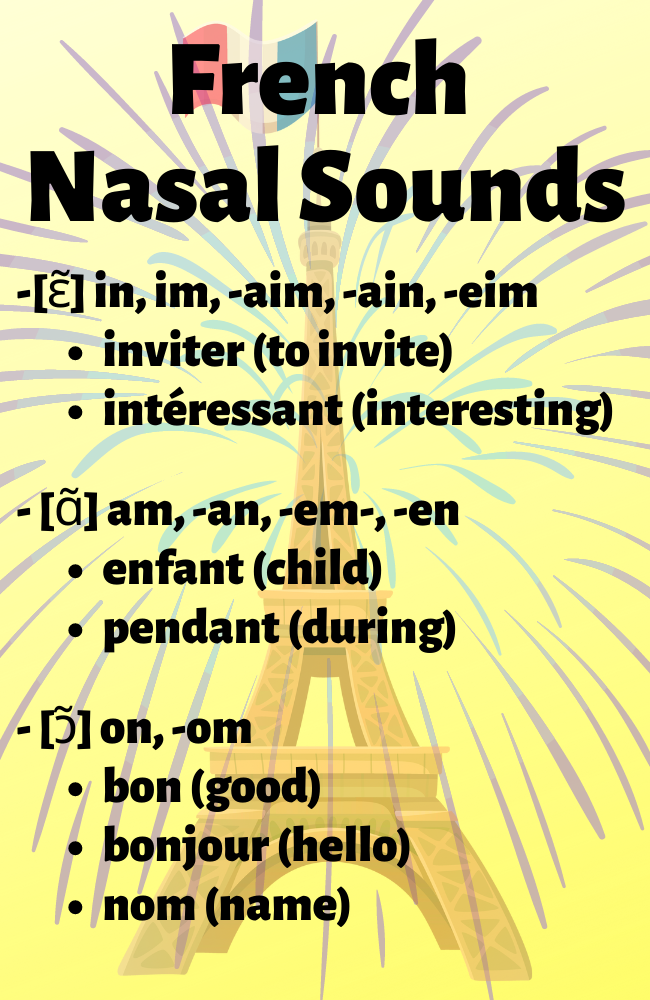
How To Read And Pronounce French Words
Learning the French reading rules is the key to mastering French pronunciation. Reading French is difficult because the language is not phonetic; the words are not pronounced exactly as they’re read. This page covers how to precisely pronounce French words based on the reading rules.
The pronunciation rules for French nasal sounds can also be particularly difficult. Keep reading to the end of the page as we’ve provided very clear explanations.
French reading rules for consonants
1. Words ending in two consonants
If a word ends in two consonants, completely ignore the last consonant and end on the second-to-last consonant. For example, the word “concert” (concert) is pronounced [kɔ̃sɛʀ]. Skip the final -t.
If a word ends in a two consonants and a nasal sound (see explanation of nasal sounds below), the same rule applies. Skip the last consonant. For example, “restaurant” (restaurant). No -t.
Examples:
- Robert
- Rochefort (city in France)
- vêtement cohting
- élégant elegant
2. Words ending in two consonants + -e
If a word ends in two consonants plus -e, the final -e forces the final consonant to get pronounced. For example, for the masculine adjective “couvert” (covered), the final -t gets ignored (see rule above). In the feminine form, “couverte”, the final -e gets sounded out: [koo-vert].
- couvert/couverte covered
3. Words ending in vowel + consonant
If a word ends in vowel plus consonant, completely ignore the last consonant. For example, the word “petit” (masculine form of he adjective short, little) is pronounced “puh-tee” or [pəti].
Examples:
- Louis
- François
- Nicolas
- bruit de fond background noise
4. Words ending in vowel + consonant + -e
If a word ends in vowel plus consonant plus the letter -e, that -e forces that last consonant to get pronounced.
For example for “petite” (feminine form of the adjective short or little, the pronunciation is “put-teet”. The final -t gets pronounced. This page on Forvo.com shows how to pronounce petit vs. petite.
- petit/petite small, short
Examples:
- Louise
- Françoise
5. CaReFuL rule
The CaReFuL rule states that if a word ends in the letters -c, -r, -f or -l, these letters must be pronounced.
Examples:
- Daniel
- Marc
- neuf nine
- parc park
The CaReFuL does have some exceptions, however. Don’t pronounce the -c on the ends of the following words:
- blanc (masculine form of the adjective for white)
- banc bench
- tabac tobacco, tobacco shop
Note that the CaReFuL rule does not apply to the infinitives of -er verbs. These end in the “ay” sound as play.
Examples:
- parler to speak
6. Ch sounds like sh
If a French word contains a “ch”, sound it out like an “sh” in English. For example, the word “choix“ (choice) sounds like “shwah”.
Examples:
- changeur change machine
- chez at the home of
7. Qu sound like -k
When you see a “qu” in a word, sound it out like a “k” in English not a “qu” like in the English word “quantity”. Thus, “que” (that, what) in French sounds like “kuh”.
Examples:
8. Single -s vs. double -ss
In French, a single -s is pronounced like a -z. For example:
- Isabelle
- désert desert
- poison poison
A double -ss sounds like -s as in “Sam”. For example:
- dessert dessert
- poisson fish
9. Soft -c vs. hard -c
When the letter -c is followed by either -e or -i as “ce” or “ci”, the -c sounds like an -s as in “Sam”.
- cerise cherry
- ciel sky
When a -c is followed by any other letter, it a hard -c or -k sound.
- classe class
10. Soft -g and hard -g
Very similar to soft and hard -c above, a similar rule applies to the letter -g. When followed by the leters -e or -g, the -g is soft.
- génial great, cool
- girafe giraffe
When followed by another letter, -g has a hard sound.
- grand big
11. Rule for -gn
In French, the -gn corresponds to an “ñ” in Spanish and has a “ny” sound like in the English word “canyon”. The phonetic symbol [ɲ] is used to show the -gn sound in dictionaries.
Examples:
- gagner to win
- gagner de l’argent to earn money
12. Rules for double -ll

A double -ll in French can be pronounced like an -l or a slight -y sound, depending on the word.
Pronounce the -ll For the words mille (thousand), ville (city) and tranquille (calm) and all other words derived from or related to these words.
- million million
- milliard billion
- village town
- tranquillité calmness
For all other words with an -ll and not related to mille, vill and tranquille, the -ll sounds like a slight -y sound.
- fille girl
- famille family
- Bastille bastille
- cheville ankle
13. What to do with -eille and -aille
Words ending in -eille sound like [ay] and words ending in -aille sounds like “I” or “eye”.
- Marseille
- bouetille bottle
- travaille (he/she works)
14. Words starting with -h
If a word starts with the letter -h, completely ignore it. Don’t pronounce the -h at all.
Examples:
- homme man
- histoire history
15. Don’t pronounce -th in English!
If a word has a -th, just pronounce -t and completely ignore the -h.
Examples:
- mathématiques mathematics
- le thé tea
16. – euil sound
The -euil sound is very difficult to pronounce. This page on Forvo gives several samples of the word “fauteuil“ (armchair). Words ending in -euille end in a light -y sound.
Examples:
- écureuil squirrel
- accueil front desk, reception
- feuille leaf
- portefeuille wallet
17. -ouille sound
Words ending in -ouille are also very difficult to pronounce. The sound is “ou-ee”. This page on Forvo gives a sample of “grenouille“ (frog).
Examples:
- nouille pasta
- andouille fool
18. -t becoming an -s
In a lot of words, a -t sounds like an -s. This occurs when the -t in the English equivalent word sounds like an -s or -sh.
For example:
- nation [nasjɔ̃] -> nation
- diplomatie [diplomasi] -> diplomancy
- democratie [demɔkʀasi] -> democracy
If the English equivalent word does not have an -s or -sh sound, the -t maintained in French.
For example:
- partie -> party
Reading rules for vowels
Mastering the vowel sounds really is the key to being about to read and pronounce French correctly. After this section we’ll touch on the nasal sounds, which can get quite tricky.
19. Ou sound
Whenever you see an -ou in a French word, read it like “oo” as in the English word “food”. The phonetic symbol for the -ou in French is [u]. The word “vous“ (you formal and plural) has this sound.
Examples:
- fou crazy
- coup hit
- beaucoup a lot
20. Single -u or “pointed” -u.
The single -u is one of the most difficult sounds to make in French. It sounds like a sharp or pointed -u coming out from puckered lips. This page on Forvo has examples of how to pronounce “tu“ (you singular and informal).
Examples:
- tu you are
- bu drank
- lu read
21. Single -i
In French, a single -i simply sounds like “ee” as in the English word “feet”.
Examples:
- petit small, little
- livre book
22. -ai sound
There are two ways to pronounce the -ai in French. For words ending in -ai, it sounds like “ay” as in the English word “play”. The corresponding phonetic symbol is [e].
Examples:
- Je donnerai I will give
- Je sais I know
When an -ai is followed by a consonant, it sounds like the -e in the English word “get”. The corresponding phonetic symbol is [ɛ].
Examples:
- fraise strawberry
- française French (adjective in feminine form)
- j’aime I like
23. -o sound
In French there are two -o sounds: an open -o and a close -o. The open -o has the phonetic symbol [ɔ]. The French word “vote“ (vote) has the open -o or [ɔ] sound.
The following are examples of the open -o in French. It’s tempting to pronounce the -o as if it were the English -o.
- opinion opinion
- opportunité opportunity
The closed -o in French sounds like “oh” as in “oh my gosh” and has the corresponding phonetic symbol [o]. The closed -o is used for -o with circumflex accent (ô), when – is the final sound of a word and -o plus s + vowel.
Examples of the closed -o:
- mot word
- hôtel hotel
- chose thing
24. -au sound
In French the letters -au are also pronounced like an open -o, or “oh” as in “oh my gosh”.
Examples:
- aussi also
- aujourd’hui today
25. -œ sound
French has a unique letter called “l’e dans l’o“ or “the -e in the -o”. It’s essentially an -o and an -e combined in to a single letter. This sample of the word for heart (cœur) on Forvo show’s how to pronounce the -œ sound.
Examples:
- sœur sister
- cœur heart

French nasal sounds
Sometimes letter combinations can be nasal and at other times the exact same letters in the exact same spellings are not nasal.
It is important to learn when a nasal sound is required and when it is not. This has to do with the way a word is broken down into syllables.
In French, if a word has vowel + consonant + vowel, the consonant always goes with the second vowel. For example, for the word “ami” (friend), the syllable breakdown is: “a-mi”.
The second key rule for French the syllabic breakdown for two syllables is that a syllable break is done between two consonants. For example, for “inviter” (inviter), syllable break is done between the -n and the -v. Hence, “in-viter”.
Thus, for the word “initiation”, there is no nasal sound on the -in. This is because the -i and the -n are not in the same syllable (i-nitiation).
For the word “inviter”, the -in is pronounced as a nasal sound because -in is the same syllable: “in-viter”.
26. -in, im, -aim, -ain, -eim, -ein, yn, yn
The following spelling patterns are a nasal sound: -in, im, -aim, -ain, -eim, -ein, yn, yn. They correspond to the phonetic symbol [ɛ̃]. “Inviter“ has this sound.
Examples:
- inviter to invite
- américain (masculine form of American)
- intéressant interesting
Note than the nasal “in” or [ɛ̃] sound is used for -en in words ending in -ien. Thus “bien“ (well) is [b + ee + ɛ̃] and not [b + ee + ɑ̃].
Also note that nasalization is cancelled when the -n or -m is doubled.
Examples:
- innocence innocence
27. -am, -an, -em-, -en
The following spelling combinations are nasal: -am, -an, -em-, -en. The phonetic symbol for this sound is [ɑ̃]. Here’s an audio sample of “temps“ (time or weather).
Examples:
- un an one year
- enfant child
- pendentif pendant
Note that if the -n or -m is doubled, there is no nasalization.
- année year
- anniversaire birthday
28. -on, -om
The spelling combinations -on and -om are a nasal -o and correspond to the phonetic symbol [ɔ̃]. For example, “non“ (no).
Examples:
- bonjour hello
- nom name
- son his/her
Note that if the -n or m is doubled, there is no nasalization.
- monnaie currency, change
- hônnete honest
29. -un, -um sound
The letter combinations -un and -um have a nasal sound corresponding to the phonetic symbol [œ̃]. This sound is very similar to the nasal -in [ɛ̃] (see above) and very difficult to differentiate. Listen to the “un” in the this sample from Forvo: “lundi“ (Monday).
Examples:
- un indefinite article
- aucun any, none
Note: it helps to know the phonetic symbols for French pronunciation for this page. These rules are covered in Exercises in French Phonics. In addition to this page we also suggest considering the course Secrets of French Pronunciation from Frenchtoday.com.
Also note that learning how to read the French accents is vital for learning how to read French. This page on our site covers the French accent marks in great detail. Another important element to French pronunciation is understanding the liaison, the linking of words. This page on our site covers the French liaison in detail.
More French lessons by David Issokson

